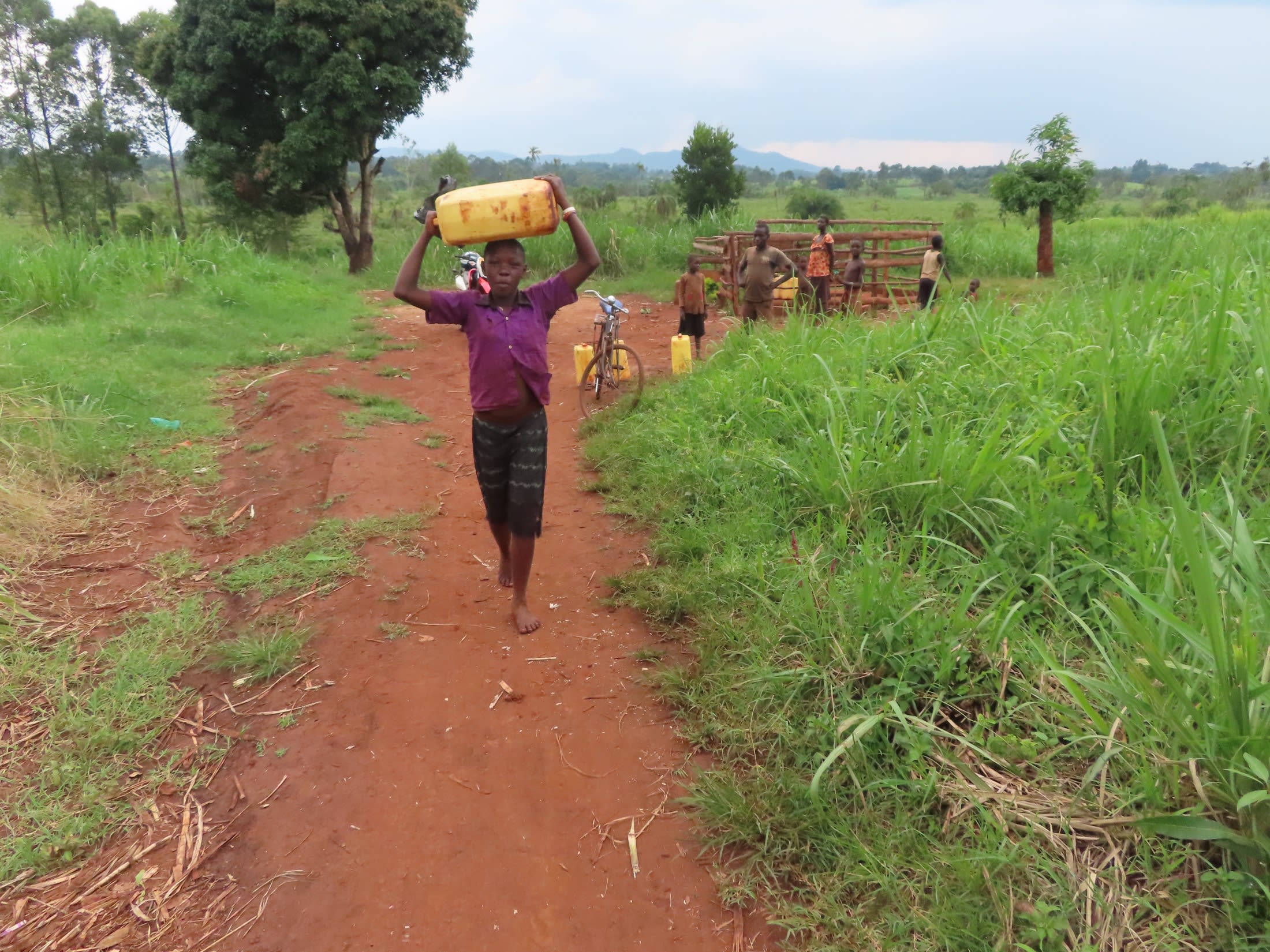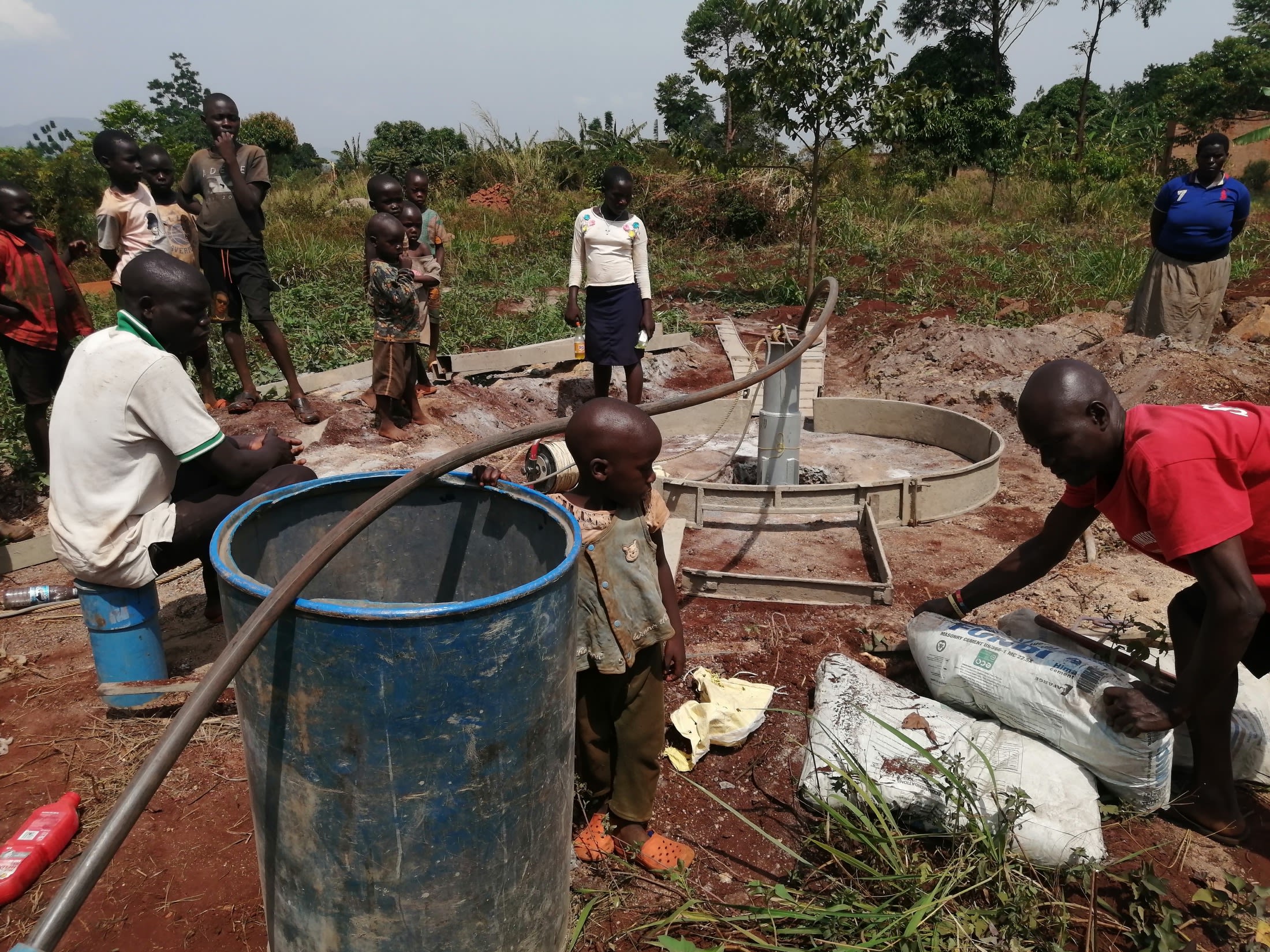With a large population of 750 people in Kisambo-Kyabakuubi, there is a continual struggle to find enough water to meet everyone's daily needs.
Most people in the community rely on a shallow dug well for their daily water, but it faces several issues. It is far away and overcrowded, which puts added strain on the pump. When the pump breaks down, it is a struggle to collect the funds needed for repairs, so it sits broken and unusable. The well is also seasonal, so at certain times of the year, it runs dry, forcing people to rely on other water sources like surface water (shown below).

"The water point is far [away] and always overcrowded because it serves a very big population from two villages, that is Kyabakuubi and Kyabayonga. This affects my daily schedule because I have to forego some activities to go and collect water," said Gerald Asiimwe, a 23-year-old laborer, shown collecting water below.

Gerald shared that he sometimes comes back from the waterpoint already tired after waiting in long queues, making it difficult for him to have the energy to go to his garden.
The adults in Kisambo-Kyabakuubi are not the only ones suffering without access to sufficient water.
"I fetch water from a shallow well," said 12-year-old Juliet N. (shown below).

Every day, Juliet comes back from school early to collect water so she can bathe and wash her school uniforms. But when she arrives at the waterpoint, she also encounters long lines and often comes home late from the well. Sometimes, because it takes so long to collect water, she is unable to wash her uniform and is punished at school the next day for being dirty.

A reliable, safe water source in this community would allow adults and children alike to focus on the things that will improve their daily lives.
Note: Our proposed water point can only serve 300 people per day. We are working with the community to identify other water solutions that will ensure all 750 people in the Kisambo-Kyabakuubi community have access to safe and reliable drinking water.
Here’s what we’re going to do about it:
New Borehole
This new borehole is an exciting opportunity for this community! We work with the community to determine the best possible sites for this well.
We conducted a hydrogeological survey and the results indicated the water table is an ideal candidate for a borehole well. Due to a borehole well's unique ability to tap into a safe, year-round water column, it will be poised to serve all of the water needs for this community, even through the dry months.
Community members will help collect the needed construction materials such as sand, rocks, and water for mixing cement. They will also provide housing and meals for the work team, in addition to providing local laborers. We will complement their materials by providing an expert team of artisans and drilling professionals, tools, hardware, and the hand-pump. Once finished, water from the well will then be used by community members for drinking, handwashing, cooking, cleaning, and much more.
Training
Training’s main objectives are the use of latrines and observing proper hygiene practices since these goals are inherently connected to the provision of clean water. Open defecation, water storage in unclean containers and the absence of hand-washing are all possible contaminants of a household water supply. Each participating village must achieve Open Defecation Free status (defined by one latrine per household) prior to the pump installation for this borehole well.
This social program includes the assignment of one Community Development Officer (CDO) to each village. The CDO encourages each household to build an ideal homestead that includes: a latrine, a handwashing facility, a separate structure for animals, a rubbish pit and a drying rack for dishes.
We also implement the Community-Led Total Sanitation (CLTS) approach with each of our village partners. This aims to improve the sanitation and hygiene practices and behaviors of a village. During these sessions, village leaders naturally emerge and push the community to realize that the current practices of individual households – particularly the practice of open defecation – are not only unhealthy, but affect the entire village. CLTS facilitates a process in which community members realize the negative consequences of their current water, sanitation and hygiene behaviors and are inspired to take action. Group interactions are frequent motivators for individual households to build latrines, use them, and demand that other households do the same.
Improved Sanitation
The aim is that all households own an improved latrine. Many households do not use a latrine but use the bush. Due to open defecation, feces are spread all over the village. This leads to waterborne diseases and contamination of groundwater and surface water. Our aim is that the community is able to live a healthy life free of preventable diseases. We endeavor that at the end of our presence in the community, people will have both access to sustainable, clean water and access to sanitation. We have now organized families to form digging groups for latrine construction, and empowered them with tools to use.





 Borehole Well and Hand Pump
Borehole Well and Hand Pump
 Rehabilitation Project
Rehabilitation Project
























